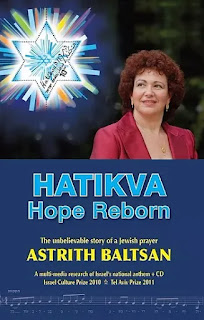NATIONAL ANTHEM
Like everything else about the Jews, probably
there is not a people in the world who have a national anthem which has gone
through so many countries, and versions of its origins. It’s been wandering around for centuries, until finally coming to rest in Palestine at the end of
the 19th century. The real story of Hatikvah mirrors the story of the Jewish
people – complex, convoluted, controversial.
An ardent Zionist, Naphtali Imber moved to the
land of Israel in 1882, and in 1886, he published his first book of poems in
Jerusalem, which included “Tikvateinu” (our Hope). His passionate poem strongly
expresses the ancient hope of the Jewish people to return and reclaim their
ancient homeland. It was adopted as the anthem of the “Lovers of Zion”, and
later of the Zionist Movement at the First Zionist Congress in 1897.
In its current version, Hatikvah incorporates only
the first stanza from the original poem. The remaining stanzas focus on the
establishment of a sovereign Israeli nation, a hope fulfilled with the founding
of the State of Israel.
“Wherever
you look at Hatikvah, there is a story. Peel off the layers and you will see
that, not only is there an endless history, there is also a yearning for an
eternal future.” That is what concert pianist and musicologist Dr. Astrith (Esterita)
Baltsan wrote in her book, “Hatikvah – Past, Present, Future.”
In her multimedia presentations given over 350 times in 17 countries, in four languages, Dr. Balstan dividies Hatikvah into three parts: melody, lyrics and
orchestration. Each element of the song, she said, proved the strength and
unity of the Jewish people. She also detailed the histories of those involved
in creating the song, and shared her amazing discoveries.
Most people attribute the music of Hatikvah to the familiar
Smetana piece “My country”. This is not true. Actually, it was picked up by 12 year-old Amadeus Mozart who heard the folk
tune in Italy and incorporated it into one of his compositions. He took the
music to Prague where Smetana adopted it and it became part of his Czech
nationally inspired symphony poem.
Dr. Baltsan discovered in her revolutionary research, that the melody is a Jewish Sephardic
version of “Birkat Tal”, the prayer for dew, written by Rabbi Yitzchak Bar
Sheshet in Toledo, Spain, in 1400. [On the first day of the spring festival
of Passover, Jews still today change one line in their daily prayers: instead of asking God
for rain, they ask God for dew].
After the expulsion of the Jews from Spain in 1492, the Jews who
fled Spain
found temporary refuge in Italy, Holland, Balkans, etc. That explains how the tune of the prayer for dew meandered around Europe and
emerged in several versions, including a 16th century Italian love song; a 17th
century Baroque fugue; a Mozart piano variation; a Swedish symphony, and others.
This tune is one of the two musical themes of Hatikvah.
The Jews have come full circle from 600 years ago – which began with the Jewish prayer
for dew. The second theme echoes a Romanian farmer’s folk song.
It is a song of hope, sung in joyful times, as well as tragic. In
1944, Czech Jews spontaneously sang it at the entry to the Auschwitz-Birkenau
gas chamber and, as reported by a member of the Sonderkommando, were beaten by
SS guards.
There is a remarkable recording of an open-air
service in Bergen-Belsen, held on the first Shabbat after liberation by the
11th Armoured Division of the British Army on April 15, 1945. The BBC’s veteran
broadcaster, Richard Dimbleby, sounded on the verge of tears as he witnessed
the survivors singing Hatikvah. “Around us are corpses that there has not been
time to clear,” said Dimbleby.
History had long ago decided that this song (“Our hope has not yet been lost/The two
thousand-year-old hope,/To be a free people in our own land”) would be the
national hymn of the Jewish people. Until 2004, it was sung by everyone but chosen by no one.
Given Israel’s diverse population with a myriad of opinions, it took the government
56 years to reach a consensus and officially select Hatikvah as its national
anthem.



Comments
Post a Comment